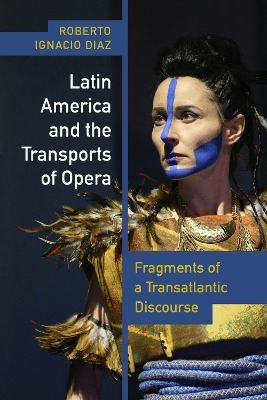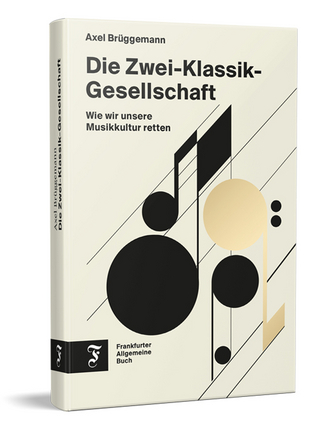
Latin America and the Transports of Opera
Fragments of a Transatlantic Discourse
Seiten
2024
Vanderbilt University Press (Verlag)
978-0-8265-0629-0 (ISBN)
Vanderbilt University Press (Verlag)
978-0-8265-0629-0 (ISBN)
Studies a series of episodes in the historical and textual convergence of a hallowed art form and a part of the world often regarded as peripheral. Perhaps unexpectedly, the archives of opera generate new arguments about several issues at the heart of the established discussion about Latin America.
Latin America and the Transports of Opera studies a series of episodes in the historical and textual convergence of a hallowed art form and a part of the world often regarded as peripheral. Perhaps unexpectedly, the archives of opera generate new arguments about several issues at the heart of the established discussion about Latin America: the allure of European cultural models; the ambivalence of exoticism; the claims of nationalism and cosmopolitanism; and, ultimately, the place of the region in the global circulation of the arts. Opera’s transports concern literal and imagined journeys as well as the emotions that its stories and sounds trigger as they travel back and forth between Europe—the United States, too—and Latin America. Focusing mostly on librettos and other literary forms, the book analyzes CalderÓn de la Barca’s baroque play on the myth of Venus and Adonis, set to music by a Spanish composer at Lima’s viceregal court; Alejo Carpentier’s neobaroque novella on Vivaldi’s opera about Moctezuma; the entanglements of opera with class, gender and ethnicity throughout Cuban history; music dramas about enslaved persons by Carlos Gomes and Hans Werner Henze, staged in Rio de Janeiro and Copenhagen; the uses of Latin American poetry and magical realism in works by John Adams and Daniel CatÁn; and a novel by Manuel Mujica Lainez set in Buenos Aires’s Teatro ColÓn, plus a chamber opera about Victoria Ocampo with a libretto by Beatriz Sarlo. Close readings of these texts underscore the import and meanings of opera in Latin American cultural history.
Latin America and the Transports of Opera studies a series of episodes in the historical and textual convergence of a hallowed art form and a part of the world often regarded as peripheral. Perhaps unexpectedly, the archives of opera generate new arguments about several issues at the heart of the established discussion about Latin America: the allure of European cultural models; the ambivalence of exoticism; the claims of nationalism and cosmopolitanism; and, ultimately, the place of the region in the global circulation of the arts. Opera’s transports concern literal and imagined journeys as well as the emotions that its stories and sounds trigger as they travel back and forth between Europe—the United States, too—and Latin America. Focusing mostly on librettos and other literary forms, the book analyzes CalderÓn de la Barca’s baroque play on the myth of Venus and Adonis, set to music by a Spanish composer at Lima’s viceregal court; Alejo Carpentier’s neobaroque novella on Vivaldi’s opera about Moctezuma; the entanglements of opera with class, gender and ethnicity throughout Cuban history; music dramas about enslaved persons by Carlos Gomes and Hans Werner Henze, staged in Rio de Janeiro and Copenhagen; the uses of Latin American poetry and magical realism in works by John Adams and Daniel CatÁn; and a novel by Manuel Mujica Lainez set in Buenos Aires’s Teatro ColÓn, plus a chamber opera about Victoria Ocampo with a libretto by Beatriz Sarlo. Close readings of these texts underscore the import and meanings of opera in Latin American cultural history.
Roberto Ignacio DÍaz is an associate professor of Spanish and comparative literature at the University of Southern California.
Introduction: Transatlantic Transports
Chapter 1. A Corpus of Fragments, I: Listening to Literature
Chapter 2. A Corpus of Fragments, II: Reading Operas
Chapter 3. Words by CalderÓn de la Barca: A Baroque Libretto in Lima
Chapter 4. Carpentier’s Singing Moctezuma: A Neobaroque Novella in Vivaldi’s Venice
Chapter 5. Havana and the Ghosts of Opera
Chapter 6. Henze and Gomes: Ghostly Testimonios in Copenhagen and Rio de Janeiro
Chapter 7. Adams and CatÁn: Magic and Realism in Houston and Paris
Chapter 8. The World in Buenos Aires: Cosmopolitans at the Teatro ColÓn
Conclusion: Caliban at the Royal Opera House
Bibliography
| Erscheinungsdatum | 05.12.2023 |
|---|---|
| Reihe/Serie | Performing Latin American and Caribbean Identities |
| Zusatzinfo | 7 b&w images |
| Verlagsort | Tennessee |
| Sprache | englisch |
| Maße | 152 x 229 mm |
| Gewicht | 272 g |
| Themenwelt | Kunst / Musik / Theater ► Musik ► Klassik / Oper / Musical |
| Geisteswissenschaften ► Geschichte ► Regional- / Ländergeschichte | |
| Sozialwissenschaften ► Politik / Verwaltung ► Vergleichende Politikwissenschaften | |
| ISBN-10 | 0-8265-0629-1 / 0826506291 |
| ISBN-13 | 978-0-8265-0629-0 / 9780826506290 |
| Zustand | Neuware |
| Haben Sie eine Frage zum Produkt? |
Mehr entdecken
aus dem Bereich
aus dem Bereich
wie wir unsere Musikkultur retten
Buch | Hardcover (2023)
Frankfurter Allgemeine Buch (Verlag)
24,00 €


